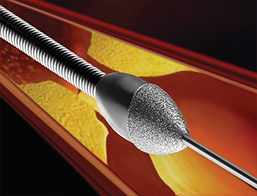Rotablation
Rotablation
- Rotablation uses a tiny drill with a diamond-tipped burr, powered by compressed air to break up calcified plaque (hard block) that is clogging the coronary artery. Breaking up the plaque restores blood flow to the heart.

With rotablation, a special catheter, with an acorn-shaped, diamond-coated tip, is guided to the point of the narrowing in your coronary artery. The tip spins at a high speed and grinds away the plaque on your artery walls. The microscopic particles are washed away in your bloodstream. This usually happens when the plaque is particularly hard or is so narrow that the balloon used in normal angioplasty can’t pass through it.
The Cardiologist uses a special catheter (a thin tube) to insert along the wire with a tiny drill at its tip, powered by compressed air. This drill is used to chip away at the plaque to gradually widen the narrowing.
Once this has been done, a balloon can be inserted and the angioplasty can proceed as normal.
Rotablation
Rotablation represents an addition to the standard PCI procedure. While a standard PTCA procedure is limited to the use of balloons and stents, rotablation also uses a tiny drill, powered by compressed air, to remove calcified deposits. Breaking up the plaque restores blood flow to the heart. A catheter is introduced and advanced to the coronary artery. The guidewire is used to cross the stenosis inside the coronary artery. The drill head is used to remove plaque deposits. The burr (drill) is introduced into the artery through a catheter (tube) and after activation is passed through the narrowed portion up and down repeatedly until the block is scrapped and the artery widened. Following this regular PCI is performed with a stent and balloon.
Rotablation is indicated when the plaque build-up inside the arteries is hard with calcific deposits. When there are large calcium deposits, the blocks are hard, and conventional balloon angioplasty may not work to widen the artery. Hence, for patients who have moderate to severe calcium causing the block, rotablation helps to drill and grind the blocks followed by balloon and stent.
Rotablation is a niche procedure done only by experienced interventional cardiologists. Dr. Gaurav Ganeshwala is one of the highly experienced operators of the rotational atherectomy system and regularly performs this procedure during complex and CHIP patients.
